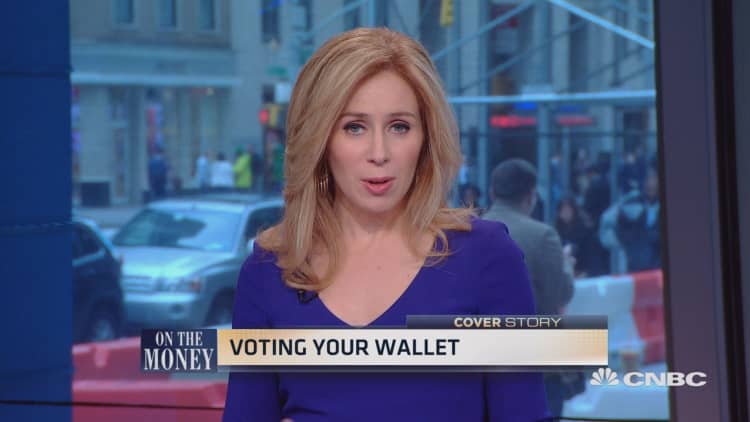
With the field of six candidates, there's a wide range of tax proposals, each of which have different effects on your wallet. For one, GOP front-runner Donald Trump's plan would slash tax rates for everyone. The real estate mogul is seeking to eliminate the current top individual income tax rate of 39.6 percent and create three tax brackets: 10 percent, 20 percent and 25 percent.
That said, a few observers have their doubts.
"I don't think it's viable," Tax Foundation President Scott Hodge told CNBC. "I think it's a dramatic overreach and an over-promise."
Established in 1937, The Tax Foundation is an independent, non-partisan tax policy research organization. For the current election cycle, the organization compared the economic effects of each of the candidates' tax plans.
Read MoreWall Street Deans: Anyone but Trump!
Studies from both the Tax Foundation and another group, the Tax Policy Center, estimate that Trump's plan could cut tax revenues by more than $10 trillion dollars over the next 10 years, resulting in a large burgeoning of the national debt. Earlier this week, Trump responded by telling CNBC he could close that gap by cutting waste and fraud in government.
However, Hodge branded that as "unrealistic," suggesting that Trump's plan doesn't have structural changes to the tax code that could improve the economy. "It's really just a tax cut plan, it's not a tax improvement plan."
Feeling the Bern of higher taxes
On the other side, Bernie Sanders is promising the opposite: Higher taxes for all. The Democratic candidate/senator from Vermont wants to raise all taxes by 2.2 percent and create four higher tax brackets for high earners. Sanders' top bracket would tax income over $10 million at a 52 percent rate.
The Tax Foundation's Hodge found that tax increase could raise $14 trillion but "would come at a dramatic cost to the economy overall."
Hodge said Sanders' plans "would reduce the size of the economy by almost 10 percent and eliminate almost five million jobs."
On Tuesday, primary votes in two battleground states, Ohio and Florida, will head to the polls. Gov. John Kasich and Sen. Marco Rubio are counting on victories in their home states to jump-start their campaigns.
Both candidates want to lower the top corporate tax rate to 25 percent, yet Kasich plans to change personal income tax rates to three brackets, with a top rate of 28 percent. Separately, Rubio wants a top bracket of 35 percent, and that top tax rate would apply to $150,000 in earnings for single filers, and $300,00 for joint filers.
The Tax Foundation found that Rubio's plan would boost growth and wages by double digits over 10 years, but would cost more than $6 trillion in static revenue.
Hodge said Democratic front-runner Hillary Clinton is "living up to promises to tax high-income people making $250,000 or more." Under Clinton's plan, those with incomes above $1 million would pay at least 30 percent in taxes. And she'd add an additional 4 percent tax on income above $5 million.
But Hodge pointed to Clinton's plan to change how profits on investments are taxed. According to the Tax Foundation, the plan has "increased incentives to delay capital gains realizations," and would be a drag on growth and wages over a decade.
The former secretary of state "wants to control when people realize capital gains by taxing people at different rates when they actually realize those gains," Hodge explained. "If you're at a high income, your tax rate could be as high as 47 percent on your capital gains, and then it lowers to 27 percent over the next seven years."
The foundation estimated that capital investment would fall by nearly 3 percent over a decade. "It could have a very chilling effect on the market and on investors overall," Hodge added.
'Just like in Europe'
Hodge called Republican Texas Sen. Ted Cruz's tax reform "a very interesting plan from a couple different perspectives." Indeed, the organization gave Cruz's plan high marks on growth, capital investment and jobs added and, of the major candidates' plans, found it cost the least.
Cruz is calling for the Internal Revenue Service to be abolished, and wants to create a flat 10 percent income tax and add a consumption tax. Yet the left-leaning Citizens for Tax Justice recently branded both Cruz and Trump's plans as bad for taxpayers.
Hodge said that the Texan "wants to eliminate the corporate income tax and replace payroll taxes with a 'business activity tax' … it's really a Value-Added Tax, much like what they have in Europe." Cruz wants the consumption tax to be 16 percent.
The VAT raises a lot of "revenue for the federal government, which allows (Cruz) to reduce individual income tax rates down to 10 percent, which is a dramatic cut for everyone," Hodge added. However, he warned the consumption tax "adds to the price of goods by 16 percent." He added the 10 percent income tax rate "offsets some of the burden that might come from higher prices."
As with any legislative plan, Hodge cautioned it should be taken with a grain of salt. "You have to take them as guidelines rather than proposals," he said.
"On the Money" airs on CNBC Saturday at 5:30 a.m. ET, or check listings for air times in local markets.




